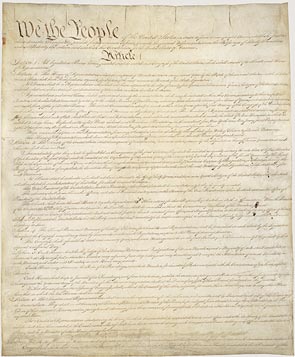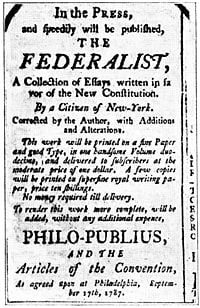Taking the hypocrisy and depraved sanctimony that characterize liberalism to a new extreme of self-parody, useless trust fund moonbats have formed a tax-exempt corporation to enforce their demand that other rich people who unlike themselves actually earned their money turn over more of it to be flagrantly wasted by bureaucrats.
The Mask Slips, Falls to Ground, Explodes
I know, I know, applying the “mask slips” metaphor to Nancy Pelosi, who appears to have spring full blown from some twisted lefty-nightmare remake of The Stepford Wives, may seem a cliché, but this extraordinary video, posted by RealClearPolitics and flagged by Brian Bolduc over on The Corner, reveals the innermost character of modern liberalism in just a little over one minute.
Charters of Freedom-U.S. Archives
In 1761, fifteen years before the United States of America burst onto the world stage with the Declaration of Independence, the American colonists were loyal British subjects who celebrated the coronation of their new King, George III. The colonies that stretched from present-day Maine to Georgia were distinctly English in character although they had been settled by Scots, Welsh, Irish, Dutch, Swedes, Finns, Africans, French, Germans, and Swiss, as well as English.
U.S. Constitution
We the People of the United States, in Order to form a more perfect Union, establish Justice, insure domestic Tranquility, provide for the common defence, promote the general Welfare, and secure the Blessings of Liberty to ourselves and our Posterity, do ordain and establish this Constitution for the United States of America.
Teachers Unions 101: “A” is for “Agitation”
If public school teachers spent more time teaching in classrooms and less time community-organizing in political war rooms, maybe taxpayers wouldn’t feel as ripped off as they do. Before the Big Labor bosses start complaining about “teacher-bashing,” let’s be clear: An increasing number of rank-and-file teachers feel exactly the same way.
Katharine Weymouth Stands Up to Unions, Rescues the Washington Post
The Washington Post exists today because of cost-cutting and quality improvements instituted by publisher Katharine Weymouth. But that hasn’t stopped some Post reporters and the Newspaper Guild from complaining about her compensation.
For her efforts, Weymouth received more than $2 million last year, mostly in bonuses tied to profitability. The New York Post reported that reporters are “fuming” over her pay, given that the paper has been cutting costs, in part by offering reporters buyouts to leave.
“Hoodwinked:How Intellectual Hucksters Have Hijacked American Culture”-Jack Cashill
It takes a village to perpetrate a cultural fraud: Behind every hoaxster playing fast and loose with facts stands a teeming mansion of elite supporters, from professionals and educators to celebrities and journalists. So says Jack Cashill in Hoodwinked, his executive summary of the cultural frauds of the Left over the past century.
The Federalist Papers
The Federalist Papers are a series of 85 articles arguing for the ratification of the United States Constitution. They were first published serially from October 1787 to August 1788 in New York City newspapers. A compilation, called The Federalist, was published in 1788. The Federalist Papers serve as a primary source for interpretation of the Constitution, as they outline the philosophy and motivation of the proposed system of government. The authors of the Federalist Papers also used the opportunity to interpret certain provisions of the constitution to (i) influence the vote on ratification and (ii) influence future interpretations of the provisions in question.
The Avalon Project-Documents in Law, History & Diplomacy
The Avalon Project will mount digital documents relevant to the fields of Law, History, Economics, Politics, Diplomacy and Government. We do not intend to mount only static text but rather to add value to the text by linking to supporting documents expressly referred to in the body of the text.







